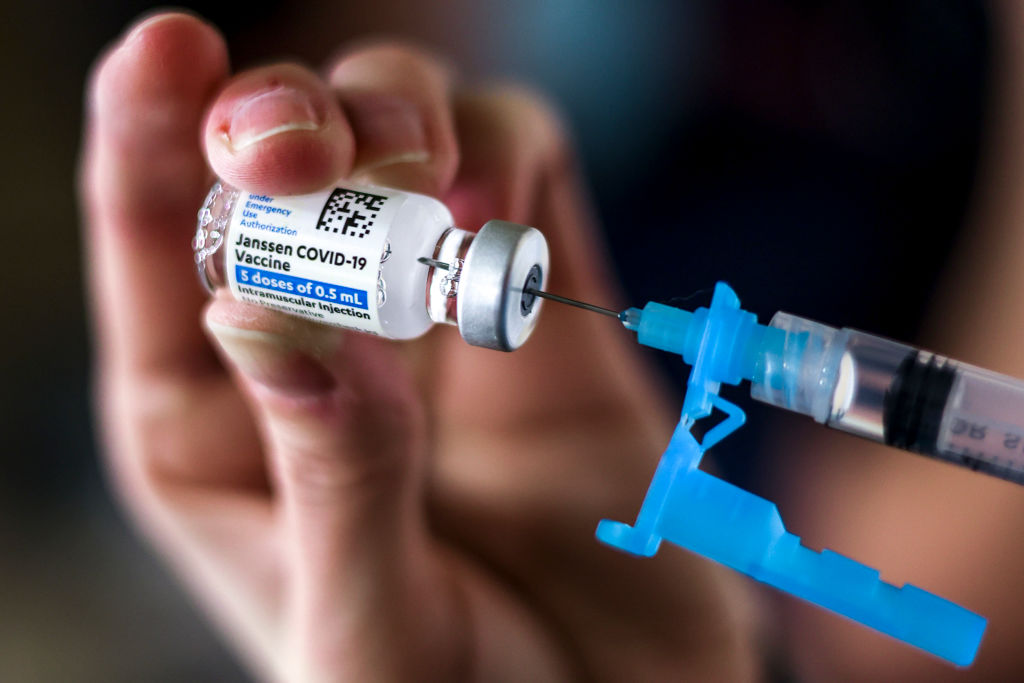J&J says booster shot provides 100 percent protection against severe COVID-19


A free daily email with the biggest news stories of the day – and the best features from TheWeek.com
You are now subscribed
Your newsletter sign-up was successful
New data indicates that a booster shot of Johnson & Johnson's vaccine provides 100 percent protection against severe COVID-19, the company announced Tuesday.
Johnson & Johnson said that in a phase 3 trial, a booster shot of its vaccine given after two months provided 94 percent protection against symptomatic COVID-19 in the United States, and it also provided 100 percent protection against severe COVID-19 "at least 14 days post-final vaccination." Antibody levels "rose to four to six times higher than observed after the single shot," the company said. The booster shot provided 75 percent protection globally.
"We now have generated evidence that a booster shot further increases protection against COVID-19 and is expected to extend the duration of protection significantly," Johnson & Johnson Chief Scientific Officer Paul Stoffels said.
The Week
Escape your echo chamber. Get the facts behind the news, plus analysis from multiple perspectives.

Sign up for The Week's Free Newsletters
From our morning news briefing to a weekly Good News Newsletter, get the best of The Week delivered directly to your inbox.
From our morning news briefing to a weekly Good News Newsletter, get the best of The Week delivered directly to your inbox.
Johnson & Johnson also said that when a booster was given six months after the first shot, there was a 12-fold increase in antibodies. The data suggests that "if you wait longer and have boost at six months or later then you likely will have better boost," Beth Israel Deaconess' Center for Virology and Vaccine Research head Dr. Dan Barouch explained to CNN.
Johnson & Johnson said it has provided this data to the Food and Drug Administration. An FDA advisory panel recently met to consider whether to authorize a booster shot of the Pfizer COVID-19 to those over 16 in the United States, but they ultimately decided not to do so, instead recommending it for those over 65 or at high risk for severe COVID-19. The Biden administration had initially planned to administer COVID-19 booster shots to all adults beginning this week. Administration health officials said last month that "booster shots will likely be needed for people who received the Johnson & Johnson" vaccine, and they said they would "keep the public informed with a timely plan" for administering these boosters once there was more data available.
A free daily email with the biggest news stories of the day – and the best features from TheWeek.com
Brendan worked as a culture writer at The Week from 2018 to 2023, covering the entertainment industry, including film reviews, television recaps, awards season, the box office, major movie franchises and Hollywood gossip. He has written about film and television for outlets including Bloody Disgusting, Showbiz Cheat Sheet, Heavy and The Celebrity Cafe.
-
 Political cartoons for February 16
Political cartoons for February 16Cartoons Monday’s political cartoons include President's Day, a valentine from the Epstein files, and more
-
 Regent Hong Kong: a tranquil haven with a prime waterfront spot
Regent Hong Kong: a tranquil haven with a prime waterfront spotThe Week Recommends The trendy hotel recently underwent an extensive two-year revamp
-
 The problem with diagnosing profound autism
The problem with diagnosing profound autismThe Explainer Experts are reconsidering the idea of autism as a spectrum, which could impact diagnoses and policy making for the condition
-
 A Nipah virus outbreak in India has brought back Covid-era surveillance
A Nipah virus outbreak in India has brought back Covid-era surveillanceUnder the radar The disease can spread through animals and humans
-
 Trump HHS slashes advised child vaccinations
Trump HHS slashes advised child vaccinationsSpeed Read In a widely condemned move, the CDC will now recommend that children get vaccinated against 11 communicable diseases, not 17
-
 A fentanyl vaccine may be on the horizon
A fentanyl vaccine may be on the horizonUnder the radar Taking a serious jab at the opioid epidemic
-
 Health: Will Kennedy dismantle U.S. immunization policy?
Health: Will Kennedy dismantle U.S. immunization policy?Feature ‘America’s vaccine playbook is being rewritten by people who don’t believe in them’
-
 How dangerous is the ‘K’ strain super-flu?
How dangerous is the ‘K’ strain super-flu?The Explainer Surge in cases of new variant H3N2 flu in UK and around the world
-
 Vaccine critic quietly named CDC’s No. 2 official
Vaccine critic quietly named CDC’s No. 2 officialSpeed Read Dr. Ralph Abraham joins another prominent vaccine critic, HHS Secretary Robert F. Kennedy Jr.
-
 This flu season could be worse than usual
This flu season could be worse than usualIn the spotlight A new subvariant is infecting several countries
-
 Covid-19 mRNA vaccines could help fight cancer
Covid-19 mRNA vaccines could help fight cancerUnder the radar They boost the immune system
